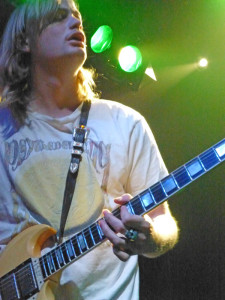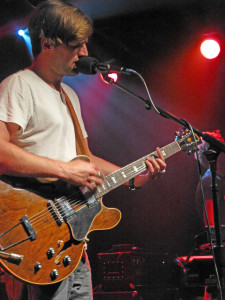Q&A: Aussies The Rubens will talk to “one million people” to win over America

The Rubens perform at the Independent in San Francisco on Sept. 14, 2013. Roman Gokhman/STAFF.
Falling back on his family to make music may have been a last resort for Sam Margin of The Rubens, who played their first two shows in San Francisco this week.
After moving back in with his parents and five siblings in rural southwest Australia, and quickly losing interest in his job at a bar, Margin, in 2011, asked his brothers Zaac (guitar) and Elliott (keys) to make music one day. Since his other brother and sisters were too young, childhood friend Scott Baldwin stepped in as drummer. The collaboration ended with a song, then two…
Fast-forward a bit; a friend of the band is at an audio engineering seminar with Grammy-winning producer David Kahne (Paul McCartney, The Strokes). The friend plays him their demo, which leads to Kahne flying Sam Margin to New York to record, with the others following afterward. There was no record deal on the table, just a hope that the expert producer can get them one.
The self-titled debut of blues-rock that has drawn comparisons to another set of brothers – the Kings of Leon – was released a year ago in Australia and re-released again in the U.S. on Warner Bros. Records this week.
Was this your first time in San Francisco?
Sam Margin: We’ve been here for other stuff; we’ve done acoustic things for agencies and promo stuff, but we haven’t played a show here.
There’s a lot of bands coming out of Australia, these days. There’s Empire of the Sun – they’re on the rise here – San Cisco, Atlas Genius…
(Empire of the Sun has) been around for a while. Are they doing well over here, San Cisco?
Yeah. They’ve been through three times in the past six or seven months.
Oh, I hate them. Just kidding. (Laughs).
What do you think about that, or is it news to you?
I think the music scene in Australia is really strong right now. We didn’t produce a lot of the rubbish that’s in the world. There’s a lot of rubbish coming from a lot of other places. In Australia, there’s a lot of authentic stuff coming out. Not to say that America and Europe and England aren’t bringing out amazing music, which they are, but we’re not filling out a lot of that other gap, which is a lot of the pop that’s happening. You know what I mean? Which means a lot of time and money for other things I think the Australian population gets behind. We’ve got Triple J radio station, which is a really big thing for Australia, and it’s kind of unique. It’s considered cool by young kids and adults, alike. It’s an Australia-wide station. You don’t have that so much in America or Europe. It reaches everyone at once.
On the other hand, it would be bad if Triple J doesn’t liker a particular band since they have so much power over what Australians listen to.
Yeah, totally. It could go either way for you. It went well for us, thank God. They helped us out a lot.
This album was released a year ago in Australia, and you went through the whole publicity cycle. Now you have to do it again in America. How does that feel?
It’s not really repetitive because this is a different thing. In Australia, by the time the record came out, there was a lot of hype. My phone would not stop ringing and we were constantly promoting. I knew America wasn’t going to be like that. With an indie band in America, it’s very rare that you suddenly become the next hot thing. It happens to some bands, like Foster the People… I wasn’t expecting that for us. We consider it a challenge to go around the country and play a million shows, talk to a million different people, and slowly (grow).
Your band is three brothers, then there’s a childhood friend.
There’s another one, now, as well. (Bassist) Will Zeglis. We’re officially a five-piece. I really need to get that sent out. He came to New York with us as a friend … to help on the record. We knew him but not that well. When it came time for tracking, he played bass. So he actually played bass on the record, but he wasn’t officially a member at that time, and not even after touring. He was a session player. Eventually, we were like, “This guy’s been involved as long as we have.” We love him, so he’s the fifth member. On the second record, he’ll be involved as much as us.
What’s your songwriting process like? With three brothers involved, there are a lot of opinions being thrown around, and it’s not like everyone can just go their separate ways at the end of the day. Ever have hurt feelings?
It’s more efficient than if we weren’t brothers. … We have our moments but we generally get along really well. Any issue can be resolved very quickly. We don’t have to tiptoe around each other. We don’t fight very often; not properly. It will be three seconds and then it’s done. We don’t hold grudges.
And you have three other siblings. Why aren’t they in the band?
They were too young. One of them was almost old enough. He was two years younger. We named the band after him. His real name is Jethro, but his nickname, that I’d given him, was Ruben. He plays the drums, but we couldn’t get him to come and play the gigs; age limits, and he was in high school.
So he’s like the band’s mascot.
The mascot, yeah. (Laughs). He comes on stage every once in a while to play drums. He’s played in front of thousands of people.
And the other siblings are even younger? When they’re old enough, will you bring them in?
Yeah, two sisters even younger than that. I think it would be fun to, yeah. We’re not going to become the Partridge Family or anything, though.
I read about how the band started, when you decided to work on songs because you had nothing else to do –
Your research is better than any research we’ve ever had by a journalist. You’re right there.
Why did it start the band on that particular day? What was special that made someone say, “I have this one song, let’s just do it.”
We didn’t even have a song at the time. I’d been playing music in London, doing solo stuff. I wanted to make it, I guess, but not really. I was just getting drunk and not trying really hard. I came back from London and was working at a bar. I eventually got bored of that and decided I should get back to working on music. So, how could I do this? I was living back at home for the first time in years, with my parents and my family. I was, like, “Well, they all play.” … I was like, “Fuck this. Lets get some musical thing going.” Zaac was finished with school and was working in hospitality and wanted to do something musical. He had dropped out of music school in college. When the band first started, Elliott still had close to a year left in high school, his most important year. So by the time his friends were going to college, we were living in New York.
Follow Roman Gokhman at Twitter.com/RomiTheWriter.


